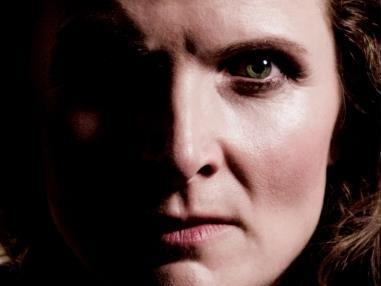‘It’s confronting to say the least’; that’s one of the things said by Lost & Found’s Director, Thomas de Mallet Burgess, about Médée, written in 1938 by Darius and Madeleine Milhaud. As a member of the 50 strong opening night audience at the former Fremantle lunatic asylum turned women’s home turned Arts Centre, I agree. The fact that Medea’s husband (the famous Ancient Greek Jason of the Argonauts story, best known for his quest for the Golden Fleece) is unfaithful… well he actually goes off and marries this woman Creuse… results in Medea killing her children and watching Jason suffer. A very modern and a very ancient tale sung in a room redolent with smells and ghosts of the past. So yes, it did give me food for thought.
Before the opera commenced we heard how this new opera company want to ‘find’ new spaces to perform ‘lost’ operas. The Medea story has been over-egged on so many occasions with much baggage, but there’s more to the story. During this pre-show talk by Burgess we also heard about ancient Irish matriarchal society where they got to change husbands after six months if things weren’t working, and that it was ‘normal’ to take their children with them; it provided a different perspective on a woman we have been culturally attuned to see as crazy and irredeemably bad, who contains ‘malice that is a woman’s and strength that is a man’s’.
Médée begins in the final sections of the original Medea tragedy as it explores her psychological state. Fiona McAndrew as Médée grew on me, with a slow warm up due to some unconvincing acting, but consistently good singing. Fortunately when she started to demonstrate her deceptive side her acting was of a higher calibre and thus totally convincing as the beguiling Médée who due to her witchy powers killed and bewitched many others before our story starts. The supporting performance by Ileana Rinaldi as La Nourrice showed the sonorous mezzo beauty of her voice.
Katja Webb in one of the key roles as Creuse, the princess that Jason marries, as he says to preserve the safety of his children as well as Médée, was using an extreme tremolo that initially gave penetration to her performance but slowly became over-used as the great beauty of her natural voice was lost. Of the men, I preferred Simon Meadows as Creon in terms of the power and complexity of his voice. Performances by the Chorus Ensemble trio were brilliant with their voices being a compelling mix of textures and strong voices.
Much of the singing by the opera leads and musicians was uniformly good, but I did walk away thinking there was a reason this opera hadn’t been performed much and got ‘lost’, as the discord of Darius Milhaud’s chord structures was extreme. Musical Director Chris van Tuinen explained after the show that Milhaud was part of the group of ‘Les Six’ in Paris in the 1920’s/30’s reacting against Debussy’s impressionism and Wagner’s romanticism, and which included Francis Poulenc. Milhaud comes across in this work as determinedly modern in the Schoenberg sense; the structure and idea behind the music is more important than its listenability. This is music that is hard work to listen to as it very rarely gives you a break, and has very little repetition, which is unusual in operatic terms. There are constant tonal contradictions with the voices seemingly working in opposition to the orchestration. One might argue that this musical discord perfectly emulates the emotional discord of the libretto.
The set design by Matthew McVeigh emphasised the tumult of Médée’s mind, with a skewed chandelier and heavy black graffiti-like accusatory text, perhaps emulating the inside of her mind. The effect of puffed, gathered curtains that had surtitles projected onto them was quite apt.
The venue was very good at capturing the tortured acoustics of a woman demented by her jealousy and amoral choices – as she sings ‘I have destroyed the last tokens of our love’. The performers were uniformly very good, and singing with such discordant musical structures is no easy feat. Overall this new Perth-based opera company, Lost & Found, is presenting some exciting opportunities to stage new and different works, and very much engaging with its audience, and for this reason alone, they are a very welcome addition to the West’s music and opera scene.
Rating: 4 stars out of 5
Médée
Music written by Darius Milhaud
Libretto by Madeleine Milhaud
Musical Direction & Orchestration – Chris van Tuinen
Directed & Conceived by – Thomas de Mallet Burgess
Medee – Fiona McAndrew
Creuse – Katja Webb
La Nourrice – Ileana Rinaldi
Jason – Richard Symonds
Creon – Simon Meadows
Chorus Ensemble – Kris Bowtell, Bonnie de la Hunty, Amy Yarham
Violin/Viola – Kate McKay
Clarinet/Bass Clarinet – Ashley Smith
Piano – Chris van Tuinen
Set Designer – Matthew McVeigh
Costume Designer – Holly Boyton
Fremantle Arts Centre
http://fac.org.au
13–24 May 2015





